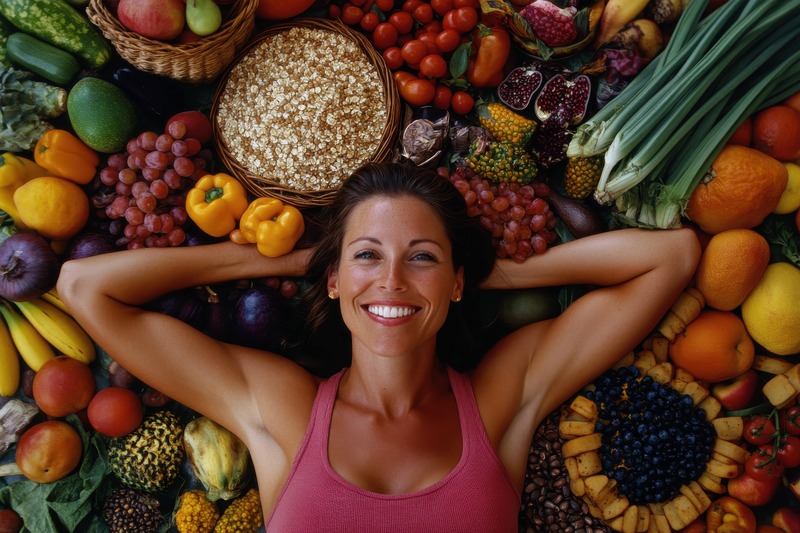The cold of winter brings not only sniffles and sore throats but is also commonly associated with a dip in spirits, a condition known as winter blues or seasonal affective disorder (SAD). Fortunately, your diet can play a crucial role in mitigating these effects. But which foods should you focus on? Let’s take a look.
Winter blues aren’t just a fleeting “low energy” phase. This issue affects approximately 5% of the French population, with symptoms ranging from mild motivation loss to severe depression. However, even if you don’t have SAD, it’s likely that you’re feeling some winter-related gloom.
Why is that? Because sunlight significantly influences two key hormones: melatonin, which governs sleep, and serotonin, the “feel-good” hormone.
During winter, shorter days lead to considerably reduced sunlight exposure. This increase in melatonin can induce drowsiness and fatigue, while serotonin production dips, potentially impacting mood, sleep, and appetite. The consequence? You may feel lethargic, irritable, and you might find yourself reaching for sugary snacks that provide only temporary comfort but worsen the situation over time.
Omega-3: Allies for the Brain and Mood
Why Are Omega-3s Essential?
Omega-3s are not just fats; they are essential fatty acids critical for optimal brain function. These fats, which the body cannot produce on its own, are vital for forming the membranes of nerve cells, thereby enhancing communication between neurons.
Additionally, omega-3s directly influence serotonin production, increasing its availability in the brain. Research published in The Journal of Psychiatry and Neuroscience has even indicated that a deficiency in omega-3s is often linked to depressive symptoms.
Where to Find Omega-3s?
- Fatty fish (salmon, mackerel, sardines, herring): two servings per week are sufficient to meet your EPA and DHA needs.
- Flaxseeds and chia seeds: rich in ALA, a form of omega-3 that the body can partially convert into EPA and DHA.
- Nuts and canola oil: perfect for enhancing your salads or hot dishes.
Consequently, the most effective sources of omega-3s are fatty fish, abundant in EPA and DHA, the active forms the body can utilize directly. For vegetarians or those who consume little fish, plant sources like chia seeds and nuts offer an alternative, although they are less readily absorbed.
B Vitamins
Are They Really Essential?
B vitamins play a crucial role in synthesizing neurotransmitters. Each vitamin in this group has a specific function, yet they tend to work together to maintain optimal mental balance.
For instance, vitamin B6 helps convert amino acids from dietary proteins into dopamine and serotonin. The two “chemical messengers” directly impact our mood. Vitamin B9 (folic acid) is essential for renewing nerve cells, while vitamin B12 protects nerves and promotes optimal brain oxygenation.
Where Can These Vitamins Be Found?
In winter, insufficient B vitamin intake can lead to significant fatigue, concentration difficulties, and low spirits. Vegetarians and vegans should be particularly cautious, as vitamin B12 is found exclusively in animal-derived products.
- Vitamin B6: found in poultry (chicken, turkey), potatoes, and bananas.
- Vitamin B9: present in leafy green vegetables like spinach, broccoli, and lettuce. Legumes such as chickpeas and lentils are also excellent sources.
- Vitamin B12: present in animal products like fish, eggs, dairy products, and red meat.
If you follow a vegan diet, it is essential to consume vitamin B12-fortified foods (like certain plant-based drinks or cereals) or to take a supplement. Consult a healthcare professional to assess your needs.
Where Can You Find These Nutrients?
- B6: poultry, potatoes, bananas.
- B9: leafy greens like spinach, broccoli, or asparagus.
- B12: animal-derived products such as meat, fish, eggs, and dairy.
If you are vegan, consider B12 supplements, as this vitamin is absent from plant foods.
Magnesium
A Natural Anti-Stress Mineral
Often referred to as the “anti-stress mineral,” magnesium directly impacts the nervous system by reducing cortisol release, the stress hormone. It also promotes muscle relaxation and improves sleep quality. A deficiency may lead to irritability, anxiety, cramps, and sleep disturbances, perpetuating the cycle of winter blues.
During winter, magnesium needs often increase due to physical and emotional stressors, making it a nutrient to monitor closely. The good news is that many tasty and accessible foods are rich in magnesium.
Which Foods to Prioritize?
- Dark chocolate (at least 70%): not only delicious, but it also contains flavonoids that positively affect mood.
- Legumes: chickpeas, lentils, red beans.
- Dried fruits and seeds: almonds, hazelnuts, sunflower seeds.
- Mineral waters high in magnesium: Hépar and Rozana.
For optimal intake, incorporate these foods into your meals or snacks. For example, enjoy a handful of almonds and a square of dark chocolate in the afternoon for an energy boost and uplifted mood.
Vitamin D
A Nearly Systematic Deficiency in Winter
Vitamin D, often dubbed the “sunshine vitamin,” is essential for our mental and physical well-being. It is synthesized in the skin through UVB rays, making it a valuable asset… but a rare one in winter when days are short and sunshine is minimal. This is especially true in 2024, where overall sunlight exposure has been notably inadequate.
Consequently, in France, between November and March, most regions do not receive sufficient UVB to enable optimal vitamin D synthesis. According to Santé Publique France, about 80% of the French population experiences vitamin D deficiency during this period.
Where to Find Vitamin D in Your Diet?
Although sun exposure is the primary source of vitamin D, certain foods also contain it:
- Fatty fish: salmon, mackerel, and sardines are among the best natural sources of vitamin D. A 100g portion of salmon can meet up to 80% of daily recommended needs.
- Eggs: the yolk is particularly high in vitamin D, containing about 20 IU (international units) per egg.
- Fortified products: certain milks, yogurts, or plant-based drinks are enriched with vitamin D, so pay attention to labels.
To compensate for the lack of sunlight, considering a vitamin D supplement may be beneficial. A single capsule or drops (usually dosed at 400 IU per day) might suffice to meet your required intake.
Complex Carbohydrates
Why Choose Complex Carbohydrates?
During winter, it’s easy to reach for quick sugars for an instant energy boost. Cookies, candies, and other sugary snacks may provide immediate comfort but can lead to significant blood sugar fluctuations. These energy spikes and crashes can drain your body and amplify feelings of fatigue.
In contrast, complex carbohydrates provide steady and sustained energy. They are digested slowly by the body, preventing blood sugar spikes. Furthermore, they encourage serotonin production, contributing to a more stable and positive mood.
Where to Find These Mood-Boosting Carbohydrates?
- Whole grains: brown rice, whole grain pasta, whole grain bread, and oatmeal are excellent sources of complex carbohydrates. Besides their energy contribution, they are rich in fiber which supports healthy digestion, crucial for overall well-being.
- Legumes: lentils, chickpeas, split peas, and red beans are rich in complex carbohydrates and plant-based proteins.
- Root vegetables: sweet potatoes are a star among complex carbohydrates, with a low glycemic index and a wealth of beta-carotene, beneficial for skin and eye health.
For a lunch that keeps you energized all afternoon, whip up a nourishing bowl: use quinoa or brown rice as a base, add roasted vegetables (sweet potatoes, squash, carrots), grilled chickpeas, and a lemon tahini sauce. This meal is not only delicious but also packed with nutrients that stabilize energy levels and elevate your spirits.
Colorful Fruits and Vegetables
Go for Color on Your Plate!
Fruits and vegetables rich in vitamins and antioxidants serve as profound protectors for your body. In winter, oxidative stress, caused by cold weather, lack of light, and sometimes an unbalanced diet, can weaken your cells and contribute to both physical and mental fatigue. The antioxidants in colorful foods counteract these effects and provide a much-needed boost.
- Vitamin C, for example, strengthens the immune system and enhances iron absorption, a critical nutrient for energy.
- Flavonoids found in red fruits exhibit anti-inflammatory properties and contribute to brain wellness.
- Carotenoids, found in orange vegetables like carrots and sweet potatoes, promote skin and eye health while shielding cells from external assaults.
- Red fruits: even frozen ones, blueberries, raspberries, and currants retain their antioxidant benefits.
- Citrus fruits: oranges, grapefruits, and lemons are major sources of vitamin C, ideal for combating fatigue.
- Orange vegetables: carrots, pumpkins, sweet potatoes. In addition to their antioxidant content, they provide complex carbohydrates.
If you still notice persistent fatigue or depression, do not hesitate to reach out to a healthcare professional.
IMPORTANT TO KNOW
Consuming foods rich in tryptophan, such as eggs, pumpkin seeds, or bananas, naturally boosts serotonin production, often dubbed the “happiness hormone.” And the magic combination? Pair them with carbohydrates to maximize the effect and drive away winter blues!







